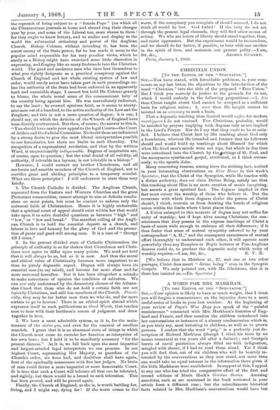CHRISTIAN UNION.
[To THE EDITOR OF THE " SPECTATOR."] SIR,—You have stated, with formidable pithiness, in your com- meats on my last letter, the objections to the introduction of the word " Christian" into the title of the proposed " Free Union." But I think you scarcely do justice to the grounds for its use, which I would embody in the following propositions :-1, less than Christ taught about God cannot be accepted as a sufficient basis for religious union ; 2, more. than He taught cannot be insisted on as necessary to such a basis.
That a dogmatic teaching thus limited would suffice for modern worshippers I do not contend. Few Christians, probably, would be satisfied by prayers implying such dogmas only as are implied in the Lord's Prayer. Nor do I say that they ought to be so satis- fied. I believe that Christ laid by His teaching about God only a foundation, whereon He intended and foresaw that his followers should and would build up teachings about Himself for which when He lived men's minds were not ripe, but which in due time were introduced into the Church by thegritings of St. Paul, and the anonymous epistles and gospel, attributed, as I think errone- ously, to the apostle John.
Many concurring reasons, among them the striking fact, noticed in your interesting observations on Ecce Homo in this week's Spectator, that the Christ of the Synoptics, while He teaches with a divine authority, does not claim Divine Being, satisfy me that this teaching about Him is no mere creation of man's imagining, but asserts a great spiritual fact. The dogmas implied in this fact must colour the worship of those who believe it. But the reverence with which these dogmas clothe the person of Christ should, I think, restrain us from drawing the bonds of religious union within the limits where Christ places them.
A Union enlarged to this measure of dogma may not suffice for unity of worship ; but if kept alive among Christians, the con- sciousness that they possess in the express teachings of Christ a basis of union wide enough to embrace all their differences ; if it thus foster that sense of mutual sympathy referred to by your correspondent " A. H.," and the consequent earnestness of mutual effort thoroughly to understand each other, it will operate more powerfully than any Bampton or Boyle lectures or Pan-Anglican decrees could do, to produce the dogmatic unity which unity of
worship requires.—I am, Sir, &c., E. V. N.
[We believe that in Matthew xi., 27, and one or two other passages, Christ does assert " divine being " even in the Synoptic Gospels. We only pointed out, with Mr. Gladstone, that it is there less insisted on.—En. Spectator.]








































 Previous page
Previous page